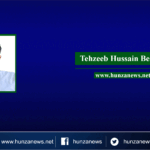While overlooked for the past seven decades, the constitutional status of Gilgit Baltistan has become an important topic in the media at the beginning of 2016. However, the sudden interest shown by Pakistan in resolving the issue seems not to be driven by a desire to adhere to the popular will of the long term deprived indigenous people in the region, but rather by political and economic interests linked to the China Pakistan Economic Corridor.
The constitutional status of Gilgit-Baltistan has become a hot topic in the media at the start of 2016. National media has been discussing the topic in their talk shows for the last few weeks. Some media outlets even invited panel members from India too.
All of sudden, why the constitutional status of Gilgit Baltistan has become an important topic of discussion while it was overlooked altogether for the last 68 years. One would also wonder why Pakistan as federation seems to show interest, more than ever, in resolving the issue. Reports also suggest that China, apparently has been pushing Pakistan to ease the resentments of the people of Gilgit Baltistan ahead of the CPEC implementation.
A large percentage of the indigenous, but not well informed, people of Gilgit Baltistan seem to be under the mistaken impression that GB is being given its overdue constitutional rights on the special demand of China, and so the government of China is praised in this regard.
It is also necessary to ask the question what has prompted China to be so interested about the constitutional rights of the two million marginalized and disenfranchised people of GB — after having remained silent for almost seven decades.
The sudden demand itself would appear not to be sympathy with GB, but rather a strategic demand to decorate the CPEC with legality and legitimacy. China is avoiding endorsement or repudiation of any position regarding the disputed nature of GB. On the other hand, the CM of GB and his cronies seem bent on doing nothing but give the “everything is okay” report to the Federal authority.
The federal government seems determined to sell out the strategically important mountainous region to China, imposing its unjustified policy on GB without considering the popular will of the long term deprived indigenous people there. Those who are still having the misguided and futile wish to have GB attain the status of becoming the 5th province of Pakistan should review the UNCIP and the claims of all external demand holders because in this phase any kind of unilateral decision may pose risk to peace and progress of the region as a whole. The alternative formula of division of GB which is being introduced by the commission is ironic and the tragic joke of the century.
The people of Gilgit Baltistan are culturally, geographically, historically, and technically one unit. It is inconceivable that the people would tolerate any such process of disintegration to be successful. The nature of the status of GB remains as yet unresolved, and in fact cannot be resolved in any of the aforementioned ways presently being put forward, because its fate is required to be decided under an impartial world body with the alongwith the outstanding Kashmir issue as per the existing UN resolutions.
Over the past decades, the proposed referendum has continued to be an unfulfilled dream due to lack of flexibility in the foreign policies and the rigid approaches of the two occupying countries. As a result, the referendum is not likely to take place in foreseeable future as well. It is the need of the hour for the Gbians to play a positive role in setting a timeline to secure their land, resources and fundamental rights by an organized well delineated plan, with clearly described actions to give traction to the objectives. By having a common goal, instead of being fragmented and divided, the people of GB can work on innovative ideas for the sustainable, non violent and well planned change in the society.
published by The Dardistan Times:





















